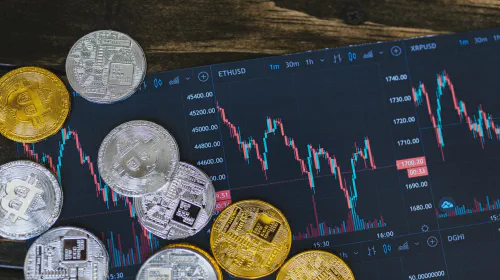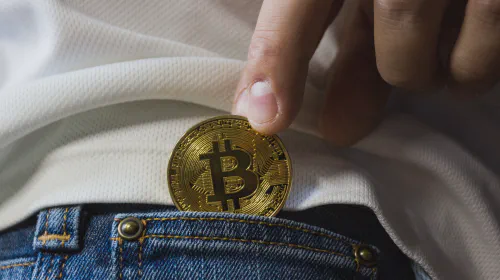Monero vs. Bitcoin: Understanding the Variances
Salomon Kisters
Sep 30, 2022This post may contain affiliate links. If you use these links to buy something we may earn a commission. Thanks!
Monero and Bitcoin are both digital currencies. The major difference is that while Bitcoin is open-source and decentralized, Monero is the most anonymous cryptocurrency in the market, being truly private and popular with shoppers and behind-the-scenes miners who value anonymity.
Cryptocurrencies have exploded on the internet scene. In 2022, there will be more than 20,000 cryptos in circulation. That is a crazy number! If you are familiar with the crypto exchange market, some of the big ones offer a fraction of this number for trading. Moreover, only a handful of cryptos have garnered the attention of trading enthusiasts.
Today, Bitcoin is still king in terms of market capitalization, so much so that it has become a household name. The cryptocurrencies that were launched after Bitcoin serve as alternatives in the cryptocurrency space. While several cryptos have been branded as Bitcoin killers, the premier cryptocurrency remains a top choice for most people.
That’s not to say that other options are nonviable. In fact, many cryptocurrencies continue to grow and are routinely traded in crypto exchanges. One of these is Monero. In his blog, we’ll take a look at the differences between Monero and Bitcoin. We’ll also suggest which one of the two works best for you.
Before we get into the Monero vs. Bitcoin comparison, let’s quickly review the two cryptocurrencies.
What is Bitcoin?
Bitcoin is the world’s first cryptocurrency, launched in 2009 by Satoshi Nakamura. It uses a decentralized computer network to record transactions in a digital ledger using cryptographic algorithms to securely verify users and their transactions.
Bitcoin was launched as a way to exchange digital currency without requiring any third party for mediation. The Bitcoin network also allowed users to trace their transactions on a public database, adding transparency to the blockchain network. Its code is open to the public.
Bitcoin’s native currency is Bitcoin (BTC) which is now the major cryptocurrency in almost every exchange. The currency is mined by users on the blockchain using a Proof-of-Work algorithm that rewards users who complete enough transactions to initiate a new block.
Bitcoin is historically one of the slowest networks. However, there have been recent fork upgrades that offer robust Bitcoin addresses and faster transactions.
What is Monero?
Monero (XMR) is a cryptocurrency released in 2014, five years after the launch of Bitcoin. It uses a Proof-of-Work algorithm originally based on the CryptoNote white paper authored by Nicolas van Saberhagen.
Monero’s protocols were designed to address issues in Bitcoin’s protocols. These issues include traceability of transactions, the resource-hungry Proof-of-Work function, bulky scripts, and financial privacy. Like Bitcoin, Monero’s blockchain is based on open-source code.
As a result, Monero works more efficiently than Bitcoin and includes a layer of privacy in the protocol by default. For users who want true anonymity, Monero is a plus over Bitcoin. Users do have an option to provide keys to third-party wallets or applications to reveal details of the sender and receiver.
Monero has the third-largest community of developers to maintain the blockchain. Active development allows consistent improvements to be made to the blockchain while giving it long-term stability.
Monero vs. Bitcoin: A Summary
Symbols
Bitcoin: BTC, ₿
Monero: XMR
Launch Year
Bitcoin: 2009
Monero: 2014
Initial Purpose
Bitcoin: A decentralized, trustless, and transparent digital store of value
Monero: A decentralized, trustless digital currency with a priority on privacy features
Mining Protocols
Bitcoin: Proof-of-Work (Bitcoin Core)
Monero: Proof-of-Work (RandomX)
Block Time
Bitcoin: ~10 min
Monero: ~2 min
Block Rewards
Bitcoin: 6.25 BTC, halving every 210,000 blocks
Monero: 0.6 XMR for each new block
Smallest Unit
Bitcoin: Satoshi
Monero: Piconero
Market Capitalization*
Bitcoin: $379.07 billion
Monero: $2.71 billion
Current supply*
Bitcoin: 19.15 million
Monero: 18.16 million
Maximum Supply
Bitcoin: 21 million
Monero: Unlimited
*This is subject to change.
Monero vs. Bitcoin: Differences in Detail
Let’s dive deeper into the intricacies of these two cryptos. We’ll take a closer look at the differences from different angles.
Prevalence
While you can get both coins directly from their respective blockchain clients, Bitcoin is truly ubiquitous in comparison. You can easily get bitcoin from any exchange, and for many apps and merchants, it’s the default crypto. Bitcoin has gained wide acceptance over the last decade.
Monero, on the other hand, may not be accepted everywhere. You’ll have to take a look at crypto lists at different exchanges in case you are interested in trading.
Speed and Scalability
On paper, Bitcoin has a slower block time than Monero. But it has a strong community of developers around it, and many solutions exist to increase the transaction speed. So you will get faster confirmations through Bitcoin. Bitcoin systems are also compatible with many different payment systems. That means it’s far easier to work with Bitcoins for your business.
To utilize the full capabilities of Monero, several blocks need to be created to make sure transactions are irreversible. So you may have to wait 20-30 minutes for safe confirmations. Monero has released ‘Bulletproof’ protocols to speed up transactions on the blockchain, but it’s still nowhere near Bitcoin in terms of handling high transaction volumes.
Privacy
Here’s where Monero shines above Bitcoin and most other cryptos. Monero uses several cryptographic and computer networking techniques to hide users’ details in a transaction. Ring signatures allow a specific group of nodes to approve a transaction while mixing decoy outputs to hide user details. Stealth addresses are generated to create outputs that hide the identity of the coin owner, and the Dandelion protocol is used to hide IP addresses.
All these features give Monero unmatched privacy. In contrast, Bitcoin keeps all the transaction details open to the public. If you want to trace a Bitcoin transaction or user, it’s very easy to do that.
Mining Algorithm
Both Bitcoin and Monero can be mined. However, Bitcoin requires powerful hardware to efficiently mine coins. The Bitcoin network can technically utilize ASICs (dedicated hardware for cryptographic processing) to get some oomph from mining operations, but these processors consume more electricity and are expensive for average users. If you have one computer, you cannot compete with dedicated mining farms.
Monero’s mining algorithm is much lighter than Bitcoin’s, so you’ll be able to work with a lighter power-efficient computer setup.
Tokenomics
Bitcoin is limited in supply and is, therefore, scarce. With scarcity comes higher value. One coin will increase in dollar value up until the total supply is distributed. Once Bitcoin starts to be accepted in many ecosystems, prices in BTC will go down because of its limited supply. It is currently valued at over 20,000 USD, although this has fluctuated many times over the years.
Monero is also available on several exchanges, and like Bitcoin, it has a higher valuation than the USD. However, its price of USD 150 per coin is no match for Bitcoin’s value. Monero cannot be used to hedge your assets against inflation as its supply is guaranteed to increase over time. More coins mean a lower price over time. Monero’s value will depend on the perception of anonymity in cross-border transactions.
Reputation
Trust in any currency is a strong driver of its value. Cryptocurrencies are no exception. Since their inception, cryptocurrencies have polarized people. They provide a level of financial freedom that is unparalleled by fiat currencies.
But cryptos also have a bad reputation. Misinformation spread by speculative traders has led to the belief that they are internet scams. Environmentalists have slammed their carbon footprint, and their use in illegal activities over the darknet put a big question mark over their token value.
Bitcoin enjoys a largely favorable reputation over Monero. The former has gained wide acceptance over the last decade, and two countries, namely El Salvador and the Central African Republic, have declared it as a legal tender. This is despite its high carbon footprint and its traceability, which will allow authorities to track and block specific users from trading Bitcoins.
Monero’s reputation as a privacy coin has unfortunately made it more popular among criminal networks on the darknet. Regulatory authorities have taken note, and some exchanges are under pressure to remove privacy coins from their currency lists. That’s bad news if you want to use it as a trading option.
It’s worth mentioning here that Monero’s privacy does help its users evade conventional cryptocurrency blockades that usually target Bitcoin users. If governments attempt to tighten the noose on Bitcoin regulations and the financial freedom of their citizens, Monero might be the most fungible token for anonymous international payments.
Monero vs. Bitcoin: which one is better?
There’s no right or wrong answer to choosing Bitcoin or Monero, but understanding how they work helps inform your decision.
Bitcoin is a reliable digital asset that has gained significant value in recent years. If you view cryptocurrency as just another payment option for shopping without using the cash in your bank account, Bitcoin might be the right option for you.
If you value your privacy above everything else and don’t mind going through the extra hoops to make international payments, consider Monero as a viable altcoin.
Have you got a blockchain project in mind but need help with implementing it? Orginstamp.com can help with a suitable decentralized solution for your business. Contact us today for a quick consultatio
Stay informed with the latest insights in Crypto, Blockchain, and Cyber-Security! Subscribe to our newsletter now to receive exclusive updates, expert analyses, and current developments directly to your inbox. Don't miss the opportunity to expand your knowledge and stay up-to-date.
Love what you're reading? Subscribe for top stories in Crypto, Blockchain, and Cyber-Security. Stay informed with exclusive updates.
Please note that the Content may have been generated with the Help of AI. The editorial content of OriginStamp AG does not constitute a recommendation for investment or purchase advice. In principle, an investment can also lead to a total loss. Therefore, please seek advice before making an investment decision.

Can Algorand Be Like Ethereum, and Does It Have a Future?
Today, we will be closely looking at how Agorand compares with Ethereum and whether this new, emerging cryptocurrency has a prosperous future or not.

Ethereum vs. Cardano - What's the Difference?
Those who are well versed in the world of cryptocurrency undoubtedly know about the Cardano vs. Ethereum debate. Let's explore.

Ethereum vs. Dogecoin - What's the Difference?
This article will explain what makes Ethereum and Dogecoin unique and how they compare with each other.
Protect your documents
Your gateway to unforgeable data. Imprint the authenticity of your information with our blockchain timestamp